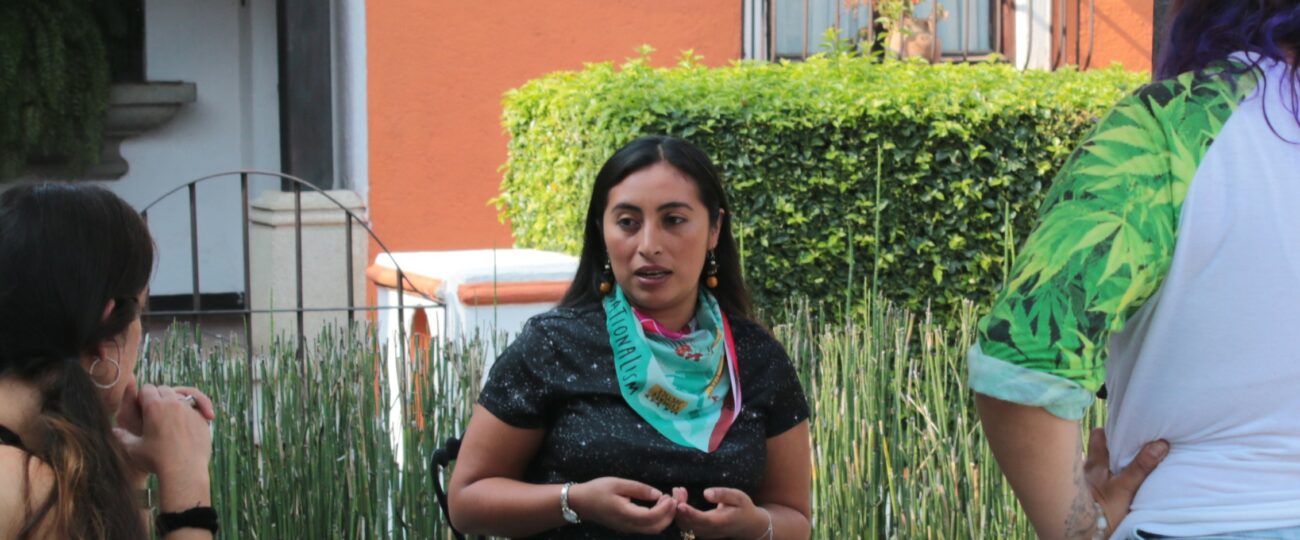Maudy María Ucelo is a World March of Women militant living in the Xinka territory, in Santa María Xalapan, department of Jalapa, western Guatemala. “I identify as a young Indigenous woman, because this is where my struggle comes from in community feminist and social movements in my territory,” she explains.
This interview was collectively conducted by Capire and Real World Radio during the meeting Waving Our Emancipatory Proposals at the ‘Berta Cáceres’ International Feminist Organizing School (IFOS), that took place May 5-7, 2024. Addressing her participation in the activity, Maudy said she felt at home sharing trust and energy with other sisters. “I believe that the struggles we wage in our movements and countries are the same, with the same approach. We want justice, equality, we want our demands met and women’s participation,” she argues.
Maudy also spoke about the meaning of good living (buen vivir) from her territory and about how important it is to appreciate and reclaim ancestral wisdom-knowledge and practices in the relationship with nature, food, and health care. Read below the translated interview or listen to it in Spanish.
Good living was mentioned a lot during our activity. What is good living and what are its characteristics, from your perspective?
To us, according to my people’s worldview and identity, good living is the respectful and valuable relationship we have with nature. We see all this as sacred, because we are part of the earth. We come from it and we go back to it. Based on it, we have our food, our livelihood.
Good living considers the bases of our Mother Earth and understands justice and women’s participation. We cannot say there is good living when we see, in our peoples and our bodies, a battle for power, deep-rooted patriarchy, a capitalist, consumerist system that tries to destroy us. They try to make us lose this connection and harmony with Mother Earth to dispossess us and then make us disappear and seize to exist to resist.
We would like to talk about how important the knowledge of grandmothers is, as their stories and wisdom-knowledge are at risk of being lost. How do you connect the importance of grandmothers and the preservation of native seeds?
I’d like to say something to the youth: may we enjoy these different forms of knowledge from our diversities and our territories. May we meet with our ancestors, our grandmothers, and resume what they did: protect the seeds, the body, the land, because everything is connected. Seeds are endangered in Guatemala and Latin America, because of privatization and this law Monsanto wants to impose on us. They are taking our local seeds from us. Our grandmothers were very knowledgeable and they knew how to take care of these seeds, because, if these seeds are lost, life is lost, and we too lose ourselves, because they are our food. This leads to the care with what we consume, what we carry inside of us. It affects not only Indigenous peoples, but all of humanity. Food comes from villages to urban areas. If there are no seeds, there is no food in rural areas, let alone in urban areas.
As young people, it is good to bring back these cosmogonic, ancestral forms of wisdom-knowledge to keep them and protect them. We need to engage in deconstruction, because there is an attempt to make us, the youth, uninvolved with these movements and this wisdom. This is a way of expropriating us so that they can take our seeds and territories. Our defense is not only through social struggle, but also through our food. We continue to resist through it. If we don’t take care of our body, which is our first territory, we will have much less power to defend our struggles. There is a cycle of life to everything: death, birth… The youth is posed a great challenge to reclaim these forms of wisdom-knowledge and keep them safe for other generations.
Maybe we won’t be able to enjoy it, but we hope other generations have a good living. This is why I think inter-generational movements are extremely important. We need this complementarity.
You mentioned feminism and good living as elements that are built from the territory, without separating them. Could you talk about how they are connected and how they meet in the struggles?
Since the times of colonization, these systems have introduced themselves as if they were very natural, as part of the culture. Unfortunately, women’s social roles are pretty much assigned to us. They only see us in care-related tasks and in the responsibility with Mother Earth, the social, the family, but that should not be the way it is. There is no harmony between humanity, between men and women. Nature has harmony—why don’t we? Because of these very systems that have invaded us and came here to destroy us. So if this happens in communities, we are not able to work together, because men won’t consider women’s opinions and participation. This also leads us to our community feminist movements.
In the communities, we see a harsher field for feminist women’s struggles. In my territory, I cannot call myself that—a feminist—, but I know I exercise feminism. It’s a “bomb-word,” a sentence, so we can see the system is deeply rooted. But now, in my collective, our view is that the hope for decolonizing and depatriarchalizing all systems lies with the youth and children.
We also contribute to this good living we imagine to be decolonized, depatriarchalized, non-hegemonic, and also with no inequalities. And we build from that. These movements contribute to this imaginary. From the perspective of good living, everything that moves is energy—plants, ourselves. So I believe this has been a very beautiful connection. We come from different nations, but, as women, we have the same goal, the same heart, and the same vibration. I think this is powerful, because we come together and support each other, which really helps us continue in our different struggles without losing sight of this goal. This is what we believe in: feminist movements, meetings for our good living.
In the face of the offensive of the pharmaceutical industry, what is the connection between ancestral wisdom-knowledge and medicinal plants?
Restoring ancestral medicine is extremely important. Like my grandmothers—who have now passed away to ancestrality—used to say, the youth today no longer appreciate natural medicine. We no longer have the same faith in the natural medicines they mentioned. Pharmaceutical industries came to steal what our grandmothers and grandfathers knew from their own worldviews about the healing power of medicinal plants, and they started to manufacture that in a different way. Now we have this habit of buying medications that are not our medicine, and we disregard what used to cure us. It is really hard for the youth to want to sow and take care of these medicinal plants. We need to restore that, because it’s what gave life and health to our people, to our grandmothers. The system does not want us to restore that.
My grandmother used to say: “How much is it to water a small plant? How much is it to have medicine? It won’t cost you a penny—the only thing you have to do is love it, speak with love so that it heals you.” If we have all this, we have paradise: we have our food, our medicine. But now, not anymore. Now young people fall ill and the first thing they do is buy industrialized medications, even when they have or can have plants and their healing energy. We have that, and we don’t apply it. That’s where diseases emerge in our bodies, because of what we use and consume, which makes us sick.
Yesterday we were talking about the contact with the moon, the contact with the earth, the cycles… Nature was speaking to us. My grandparents would always say that there is a little bird that sings and lets us know rain is coming, or announces the winter. So they prepared the land for sowing. They truly respected nature. They consumed medicine, mint tea, chamomile tea, and they had that within reach—they didn’t need money, because they could live and heal with that.
Plunder and the exploitation of the land affect us so much that now it’s no longer easy to find medicinal plants. This agroecological practice, which considered a friendship with nature, is lost. Now everything is chemical—so many agrochemicals are used. There was no need for fertilizers, for adding agrochemicals to the land. Just water, love, and cultivation were enough. Some plants have been exterminated. It’s really rare to find people who have their own family garden, their botanical garden. This is why it is extremely important to pay attention to this, because if medicinal plants and seeds come to an end, I believe that we, as humanity, will too.




